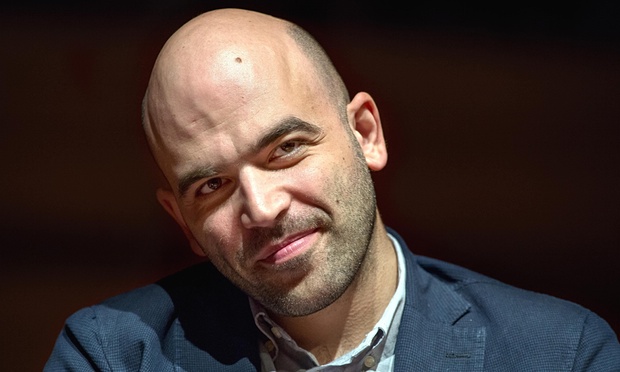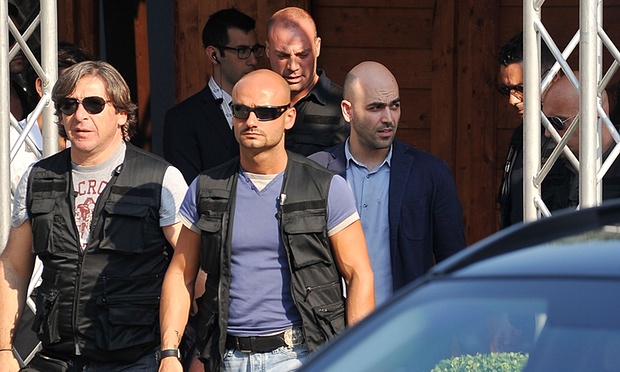The Man Who Exposed the Lie of the War on Drugs
IN FOCUS, 4 Jan 2016
Roberto Saviano already lives under armed guard after writing about the Neapolitan mafia. Now he is determined to uncover capitalism’s complicity with the narco-lords of South America.

Roberto Saviano: ‘The black market has become the biggest market in the world.’ Photograph: Sintesi/Sipa/Rex Shutterstock
26 Dec 2015 – Pablo Escobar was “the first to understand that it’s not the world of cocaine that must orbit around the markets, but the markets that must rotate around cocaine”.
Of course, Escobar didn’t put it that way: this heretical truth was posited by Roberto Saviano in his latest book Zero Zero Zero, the most important of the year and the most cogent ever written on how narco-traffic works. Here is a book that speaks what must be told at the end of another year of drug war spreading further and deeper, that tells what you will not learn from Narcos, Breaking Bad or the countless official reports.
The realisation that cocaine capitalism is central to our economic universe made Escobar the Copernicus of organised crime, argues Saviano, adding: “No business in the world is so dynamic, so restlessly innovative, so loyal to the pure free-market spirit as the global cocaine business.” It sounds simple, but it isn’t – it is revolutionary and, says Saviano, it explains the world.
Saviano – who lives in hiding under 24/7 guard, after death threats arising from Gomorrah, his book about the Neapolitan mafia – and I were due to discuss Zero Zero Zero at the Hay Arequipa book festival in Peru this month. But Saviano was unable to make it, because of difficulties in arranging his movements. For eight years, he has lived in undisclosed venues, with a permanent dispatch of seven carabinieri guards, rarely spending more than a few nights in the same bed. A video link to Peru proved too complicated, but what Saviano had to say was too important to let go, too pressing and radical to lose in the ether of the logistics. In the end we spoke by telephone last weekend.
“Capitalism,” says Saviano, “needs the criminal syndicates and criminal markets… This is the most difficult thing to communicate. People – even people observing organised crime – tend to overlook this, insisting upon a separation between the black market and the legal market. It’s the mentality that leads people in Europe and the USA to think of a mafioso who goes to jail as a mobster, a gangster. But he’s not, he’s a businessman, and his business, the black market, has become the biggest market in the world.”

Roberto Saviano and bodyguards attend the 2013 Giffoni film festival in Italy. Photograph: Stefania D’Alessandro/Getty Images
This is Saviano’s sagacious heresy. For decades, writing on global mafia has presumed a Manichean schism between cops and robbers; our healthy society and law enforcement on one hand battling organised crime on the other (with occasional erring by the former). But the trail blazed by Saviano and very few others demolishes that account, backed by every recent development in Mexico’s narco-nightmare, including and especially the escape, again, of the heir to Escobar’s mantle, Joaquin “Chapo” Guzman, from supposedly maximum-security jail. Narco cartels like Guzman’s are not adversaries of global capitalism, nor even pastiches of it; they are integral to – and pioneers of – the free market. They are its role model.
We hear much these days about the pros and cons of legalising drugs, but very little about narco-traffic as political economy. Now, Saviano articulates and demonstrates what many of us who write about mafia have been trying for years to shout from rooftops, only none of us climbed high enough, cried as loud, or crystallised it like he does. Here it is, the lie of any dividing line between legal and illegal. Here it is, laid bare: cartel as corporation, corporation as cartel; cocaine as pure capitalism, capitalism as cocaine, known in its purest form as zero-zero-zero – a wry reference to the name of the best grade of flour, ideal for pasta.
Saviano writes in his own distinct style of narrative literary reportage, at once factually informative and impressionistic. He opens Zero Zero Zero with a scathing tragicomic reflection on who in your life uses cocaine: “If it’s not your mother or father… then the boss does. Or the boss’s secretary… the oncologist… the waiters who will work the wedding… If not them, then the town councillor who just approved the new pedestrian zones.” Within three-score pages he has stripped bare the system whereby – and why – the white powder got up their noses. “Cocaine,” he concludes, applying the logic of business school, “is a safe asset. Cocaine is an anticyclical asset. Cocaine is the asset that fears neither resource shortages nor market inflation.” Of course, cocaine capitalism – as brazenly as any other commodity, possibly more so – has “both feet firmly planted in poverty… [and] unskilled labour, a sea of interchangeable subjects, that perpetuates a system of exploitation of the many and enrichment of the few”.
“Cocaine becomes a product like gold or oil,” he adds in conversation, “but more economically potent than gold or oil. With these other commodities, if you don’t have access to mines or wells, it’s hard to break into the market. With cocaine, no. The territory is farmed by desperate peasants, from whose product you can accumulate huge quantities of capital and cash in very little time.
“If you’re selling diamonds, you have to get them authenticated, licensed – cocaine, no. Whatever you have, whatever the quality, you can sell it immediately. You are in perfect synthesis with the everyday life and ethos of the global markets – and the ignorance of politicians in the west to understand this is staggering. The European world, the American world, don’t understand these forces, they don’t have the will to understand narco-traffic.”
In a previous book, soon to be translated, called Vieni Via Con Me – Come Away With Me – Saviano talked about the “ecomafia” for which it is “always fundamental to be looking for terrain and spaces in which to conceal and proliferate itself”, just as a corporation carves out markets. In Zero Zero Zero, he writes about what might be called the genealogy of narco-syndicates, from their paternalistic period of “conservative capitalism” to the lean, mean multinational corporations they have become: buying failing banks, working the credit economy, taking over interbank loans. Permeating the system until they become indistinct from it, until (writes Saviano in Vieni Via Con Me): “democracy is literally in danger”, and we become “all equal, all contaminated… in the machine of mud”.
“So the story of narco-traffic,” he says now, “is not something that happens far away. People like to think of this disgusting violence as something distant, but it’s not. Our entire economy is infused with this narrative.”
For some reason, he says, the Anglo-Saxon world is slower to understand the innate criminality of the “legal” system than Latin societies. “I think the Anglo-Saxon, Anglo-American world is infused by a kind of Calvinist positivism; people want to believe in the health of their society,” says Saviano, even though “what this all means is that, for instance, the City of London is a far more important centre for laundering criminal money than the Cayman Islands”.
The mafia, he argues, has a particular way of entrenching its presence and increasing its strength, in a manner almost Darwinian, evolutionary: “the force of the mafia is this. If a mafioso messes up, he dies – and thus they develop a system of survival. When they make a mistake, they are killed and replaced by someone even more ruthless, so that the organisation becomes even stronger.”
At the start of this year, writing from New York, Saviano described his threatened life under guard in our sister paper, the Guardian, and in this book that followed he asks himself, poignantly: “Is it really worth it?”
“I write about Naples, but Naples plugs her ears,” he laments. It is, he writes, “my fault if the articles I keep writing about the blood spilled in the cocaine markets fall upon deaf ears”. Any reporter or writer on these subjects feels a version of these feelings, but – apart from our colleagues in Mexico or Colombia – with so much less to pay than Saviano has paid: with his liberty and security.
“Sometimes I think I’m obsessed,” he reflects in the book, but “other times I’m convinced these stories are a way of telling the truth”. Here we have it. Whether obsessed or not, Saviano realises the brutal truth: that to understand narco-traffic is to understand the modern world. “You can’t understand how the global economy functions if you don’t understand narco-traffic”, he says in conversation.
A remarkable passage in Zero Zero Zero explains why: a transcription of an FBI tape recording of a seasoned Italian mafioso in New York schooling young Mexican footsoldiers in the difference between law and “the rules”. Laws are there to be broken, he urges, but the rules of the organisation are sacrosanct, on pain of death. “The law is supposed to be for everybody,” Saviano tells me, “but the rules are made by the so-called men of honour. This is how narco-traffic explains the world, by embracing all the contradictions of the world. To succeed in narco-traffic, you apply the rules to break the law. And today, any big corporation can only succeed if it adopts the same principle – if its rules demand that it break the law.”
_____________________________________
Ed Vulliamy is a writer for the Guardian and Observer, and author of Amexica: War Along the Borderline
Go to Original – theguardian.com
DISCLAIMER: The statements, views and opinions expressed in pieces republished here are solely those of the authors and do not necessarily represent those of TMS. In accordance with title 17 U.S.C. section 107, this material is distributed without profit to those who have expressed a prior interest in receiving the included information for research and educational purposes. TMS has no affiliation whatsoever with the originator of this article nor is TMS endorsed or sponsored by the originator. “GO TO ORIGINAL” links are provided as a convenience to our readers and allow for verification of authenticity. However, as originating pages are often updated by their originating host sites, the versions posted may not match the versions our readers view when clicking the “GO TO ORIGINAL” links. This site contains copyrighted material the use of which has not always been specifically authorized by the copyright owner. We are making such material available in our efforts to advance understanding of environmental, political, human rights, economic, democracy, scientific, and social justice issues, etc. We believe this constitutes a ‘fair use’ of any such copyrighted material as provided for in section 107 of the US Copyright Law. In accordance with Title 17 U.S.C. Section 107, the material on this site is distributed without profit to those who have expressed a prior interest in receiving the included information for research and educational purposes. For more information go to: http://www.law.cornell.edu/uscode/17/107.shtml. If you wish to use copyrighted material from this site for purposes of your own that go beyond ‘fair use’, you must obtain permission from the copyright owner.
Sounds an interesting book,but when you consider what happens to whistleblowers like Edward Snowden or Julian Assange or John Kiriakou who just tell the truth and are considered criminals by the legal authorities, I think his complaints are excessive. At least he is alive and “free”!!
He is Italian and lives in Italy. Not an American.